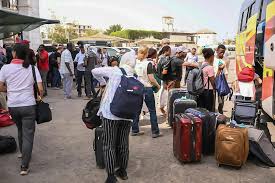The Federal Government has begun consultations on the safe and dignified return of about 15,000 Nigerians currently stranded in Cameroon, Niger, Chad and other countries.
This was disclosed by the Federal Commissioner of the National Commission for Refugees, Migrants and Internally Displaced Persons (NCFRMI), Alhaji Tijani Ahmed, during a media briefing on Friday in Abuja.
Ahmed stated that over six million people are currently displaced within Nigeria, while thousands of Nigerian refugees remain scattered across the globe.
“We have 15,000 Nigerians that want to return home voluntarily. In addition, there are over 100,000 foreigners residing in Nigeria as refugees. The Commission is responsible for providing support to all of them,” he said.
He expressed gratitude to President Bola Tinubu for the continued support extended to the Commission and the Ministry of Humanitarian Affairs in handling these responsibilities.
Ahmed also announced that Nigeria would be hosting the first thematic meeting under its current chairmanship of the Rabat Process – a Euro-African platform for dialogue on migration and development. The meeting is scheduled for May 13–14 and will bring together over 100 delegates from 57 partner countries.
The event, themed “Youth, Innovation and Education: Driving the Future of Migration,” is expected to promote bilateral discussions that will improve migration governance.
“Our leadership role in the Rabat Process, though for one year, offers a vital platform for knowledge sharing and the enhancement of migration management strategies,” he added.
Ahmed further highlighted challenges in migration governance, emphasising the need for better advocacy to educate young people on safe and legal migration routes.
“Migrants must be informed of the consequences of irregular migration, which often involves dangerous and unlawful journeys. Legal migration should be promoted to reduce associated risks,” he said.
He called for improved collaboration among stakeholders, including the media, to promote responsible and effective migration governance.
(NAN)


